Linda Rodriguez's Blog, page 14
May 6, 2013
Sparking Creativity
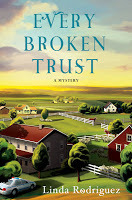 Tomorrow, my second Skeet Bannion novel, Every Broken Trust, will be published. I'm super excited, and I'm also grateful for all the people who pre-ordered this book. The official book launch will take place Friday, May 10, at 6:30 p.m. at Mysteryscape, 7309 W. 80th Street, Overland Park, KS. If you're in the area, I hope you'll join me there. If not, I hope you'll take a look at Every Broken Trust at your nearest bookstore or online outlet. Librarian and book reviewer, Lesa Holstine, said today of this book, "Every Broken Trust is one of the best traditional mysteries I've read this year."
Tomorrow, my second Skeet Bannion novel, Every Broken Trust, will be published. I'm super excited, and I'm also grateful for all the people who pre-ordered this book. The official book launch will take place Friday, May 10, at 6:30 p.m. at Mysteryscape, 7309 W. 80th Street, Overland Park, KS. If you're in the area, I hope you'll join me there. If not, I hope you'll take a look at Every Broken Trust at your nearest bookstore or online outlet. Librarian and book reviewer, Lesa Holstine, said today of this book, "Every Broken Trust is one of the best traditional mysteries I've read this year."The final winner of my month-long blog giveaway is Diane Waddell. Diane, email me your postal address, and I'll mail your prize (a copy of the anthology, Feeding Kate, and an elephant sculpture) to you. I hope you've all had fun with this contest as we've built up to the pub date for Every Broken Trust. And now, to today's blog post.
Sparking Your Creativity
As an artist and creative person, I can experience times when I reach down for ideas, for creative excitement, for images, and come up temporarily empty. These have usually been times that have combined lots of creative overwork and lots of business work—taxes, promotion, correspondence, contracts, freelance editing, etc. This kind of emptiness and feeling creatively dry can be terrifying, but I’m now used to it, and I know what to do to refill the well and spark new creativity. In these circumstances, it’s necessary to take time to do things to build up new creativity energy within you. So here are ten ideas to get you started.
 Journal Writing—This is the backbone of the creative life, especially for writers. I’m not necessarily talking about a daily diary. This is a notebook in which you write about what you see and hear, turning it into dialogue or sensory description. This is where you can work with writing prompts from books, workshops, tapes, and DVDs, your version of the pianist’s daily scales. Set a kitchen timer for a few minutes and do some freewriting to unload some of the chattering of your surface mind and move into deeper ideas.
Journal Writing—This is the backbone of the creative life, especially for writers. I’m not necessarily talking about a daily diary. This is a notebook in which you write about what you see and hear, turning it into dialogue or sensory description. This is where you can work with writing prompts from books, workshops, tapes, and DVDs, your version of the pianist’s daily scales. Set a kitchen timer for a few minutes and do some freewriting to unload some of the chattering of your surface mind and move into deeper ideas.Read Poetry—I’m a poet, as well as a novelist, but I’ve been surprised by how many commercially successful novelists I’ve met who say they regularly or occasionally read poetry as a springboard for their writing. It actually makes great sense because the poet deals in imagery, which is the language of the right (creative) brain. I know that, whenever I read poetry, it sets my mind whirling with tons of ideas and images. I have come up with ideas for entire novels from reading a poem.
Read Something Very Different for You—If you always read and write poetry, check out a popular novel. If you’re a mystery reader, take a look at what science fiction writers are coming up with. If you read and write literary fiction, pick up a romance novel. Jog your mind from its habitual ruts of thinking and imagining. Stretch out of your comfort zone. Even if you don’t like what you read, it should still shake up your mind enough to start generating ideas, images, and characters.
Singlehanded Brainstorming—Most of us have been taught how to do and forced to sit through group brainstorming sessions before. Take those techniques and a sheet of paper with pen (or iPad or laptop), get comfortable, set a timer again, and start throwing out ideas at top speed. Same rules as with the group process. You can’t disqualify any idea, no matter how unrealistic. You want to generate as many ideas as you can as quickly as you can. Just list them down the page—or even use a voice recorder to capture them. After the timer goes off, you can go down the list considering the possibilities you’ve listed. Look for possibilities to combine aspects of ideas. Write down any new ideas that get sparked by your consideration of the ideas already down on the page. Choose one or two promising (or least abhorrent) ideas and freewrite about them in your journal.
Making Lists—I love listmaking. Make lists of ideas, of characters, of backgrounds you’d like to use someday, of isolated bits of dialogue or description, of actions you’d like to see a character to take. My favorite is to write a list of scenes I’d like to read—exciting scenes, action-filled scenes, emotional scenes, surprising scenes, suspenseful scenes. They don’t have to have anything to do with any project you’re working on or any character you are writing or have written. They just need to be scenes you’d love to read—because scenes you’d love to read are scenes you’d love to write.
Visit a Museum, Gallery, Play, Film, Concert—We writers live and breathe words. Sometimes we need to get out of our heads and see or hear art that isn’t primarily word-based. It can be especially fruitful to go to a film in a language you don’t understand or an art exhibit of a kind you know nothing about. When we have no words to use to explain or understand what we’re seeing, our brains are kicked into another mode of functioning that can become quite generative. Wander around a gallery or museum and take in the colors and shapes. Sit in a concert hall or movie theater and let the music or film engulf you completely, washing through your brain. Come out seeing or hearing in a slightly different mode.
Draw, Paint, Knit, Spin, Sew—Even better than looking at art is making it. Sink your hands into clay or fiber. Splash ten different colors next to each other, taking note of the changes each new color creates. Feel the texture of the fabric, thread, yarn, fiber as you work with it to make something new. Take a penciled line and see what you can create with it. All of this also kicks in the right brain, the imagistic, creative part of us. Stay in beginner mind without worrying how “good” your art will be. This is—and should be—play, completely carefree and innocent.
Go for a Walk—Physical exercise is always a good thing for us sedentary word slugs, but even more important than its many health benefits are the creative benefits of simply moving your body through space. As you move around, your brain begins to get unstuck and to move, as well. A nice, long walk outdoors (preferably in scenic surroundings) can often jumpstart the solution to a creative dry spell. Sometimes a sterile period can arise from being overstressed. Walks are one of the best ways to counter such stress and relax the mind and body.
Arrange Flowers/Rearrange Some Belongings—In the Chinese art of feng shui, rearranging 27 items will start stuck soul energy flowing again. Moving belongings into new configurations, trying for a more pleasing pattern, has long been a cure for the blues and the blahs. We are pattern-recognizing and pattern-creating organisms. To change the habitual patterns that surround us charges us with new energy. A smaller, simpler version of this is to gather or buy some flowers and assemble them into flower arrangements that please our aesthetic sensibilities. Spending a little time in creating pleasing, artistic arrangements of flowers or accessories will provide a creative boost to stuck energies.
 Go to Lunch with a Creative Friend or Two—Everyone has one or more friends or acquaintances who are creative sparklers. Like the child’s fireworks favorite, they give off showers of sparks, or creative ideas, constantly. They are positive and upbeat and always focused on possibilities. Spending some time with them will leave you filled with ideas, energy, and excitement. It’s always worthwhile to give them a call and set up a relaxed lunch in a nice place. Rather than complain about how dry and sterile things are for you right at the moment, ask them what’s new with them and what they see as possibilities for the future. As they take off shooting into the blue yonder, follow them wholeheartedly and build on all their ideas. You’ll walk away at the end of lunch with a big smile on your face and a bunch of ideas bubbling in your unconscious. Cherish these friends, even if they are unrealistic and immature. Their wild, creative energy is invaluable when your own has temporarily deserted you.
Go to Lunch with a Creative Friend or Two—Everyone has one or more friends or acquaintances who are creative sparklers. Like the child’s fireworks favorite, they give off showers of sparks, or creative ideas, constantly. They are positive and upbeat and always focused on possibilities. Spending some time with them will leave you filled with ideas, energy, and excitement. It’s always worthwhile to give them a call and set up a relaxed lunch in a nice place. Rather than complain about how dry and sterile things are for you right at the moment, ask them what’s new with them and what they see as possibilities for the future. As they take off shooting into the blue yonder, follow them wholeheartedly and build on all their ideas. You’ll walk away at the end of lunch with a big smile on your face and a bunch of ideas bubbling in your unconscious. Cherish these friends, even if they are unrealistic and immature. Their wild, creative energy is invaluable when your own has temporarily deserted you.One or more of these ten methods should start your creative powers working once again. I’ve never had to go through more than a couple of these at a time to get my creative mojo stirring. Post this list near your desk, and don’t spend any time or energy bewailing it when a creative dry spell hits. Just reach for this and try whichever of these ideas looks most appealing at the time. If the first doesn’t completely prime your creative pump, move to another of them. Creativity never leaves, but sometimes it needs a spark to start the engine running again. So spark your creativity!
Published on May 06, 2013 15:06
April 30, 2013
Final National Poetry Month Poem & Giveaway Winners
 I have been running a blog contest for books to celebrate the upcoming publication of my second novel, Every Broken Trust, on May 7. Every week, all those who leave comments on any blog post of the week are entered for signed ARCs and hardcovers of my novels and of anthologies in which I have work--and sometimes original artwork, as well. Winners of last week's blog giveaway are Storytellermary and Susan D. Please email me your postal addresses at lindalynetterodriguez (at) gmail (dot) com. Mary won a signed ARC of Every Broken Trust, and Susan won a signed copy of Feeding Kate, a crime anthology to benefit the Lupus Foundation.So be sure to leave a comment and check back frequently to see if you've won.
I have been running a blog contest for books to celebrate the upcoming publication of my second novel, Every Broken Trust, on May 7. Every week, all those who leave comments on any blog post of the week are entered for signed ARCs and hardcovers of my novels and of anthologies in which I have work--and sometimes original artwork, as well. Winners of last week's blog giveaway are Storytellermary and Susan D. Please email me your postal addresses at lindalynetterodriguez (at) gmail (dot) com. Mary won a signed ARC of Every Broken Trust, and Susan won a signed copy of Feeding Kate, a crime anthology to benefit the Lupus Foundation.So be sure to leave a comment and check back frequently to see if you've won.Today's the final day of April, National Poetry Month. As I usually do, I've been putting up poems all month to celebrate, and here's the final one. Last week, I did a guest blog on bad boys at Jungle Red Writers, and there was a lot of interest expressed in my Coyote poems, so I thought I'd close out National Poetry Month with Coyote.
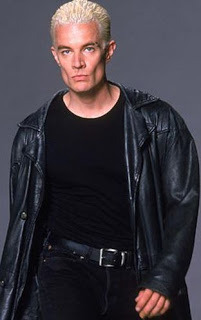
COYOTE IN BLACK LEATHER
Coyote slides on black leatherover the T-shirt that reins in biceps, shoulders, chest.Dark jeans and biker boots cover the rest of his long, lithe body as he invadesyour everyday, suburban lifelike a growl.You avert your eyes, pretendyou don’t watchhis tight, hard body, his mocking face.You know he’s bad, doesn’t belong.Besides, seeing him makes your face too red, your breath too short, your bones too soft, your clothes too tight. You pretendnot to peek, don’t want him to catch you lookingat the hungry way he stares at you.Coyote has no class.
Coyote is your secret.You tell him it’s more exciting that way.He lifts the eyebrow bisected by a scar and staresyou into silence. He knowsyou’re ashamed. He thinksyou’re ashamed of him.Coyote takes you to dangerous places.In dark, dirty bars, he threatens drunksand fights to protect you.Coyote takes you where no one else can.Coyote takes youwhere you can’t admit you want to go.
Published in Heart’s Migration (Tia Chucha Press, 2009)
Happy National Poetry Month to all of you! Leave a comment for a chance at the giveaway. And don't forget to pre-order your copy of Every Broken Trust! If you're in the Kansas City area, join me in celebrating at my book launch, Friday, May 10, at 6:30 p.m. at Mysteryscape, 7309 W 80th St., Overland Park, KS.
Published on April 30, 2013 09:27
April 26, 2013
Learning the Art and Craft of Poetry (Part Two)
This is the second part of a series on learning the art and craft of poetry when you can't always get to workshops or conferences.
Don't forget that all this month I have giveaways for books and other goodies taking place to celebrate the upcoming publication of my second Skeet Bannion novel, Every Broken Trust, on May 7. And if you're near the Kansas City area, join me and an interesting crowd of friends for the official launch at 6:30 p.m. on Friday, May 10, at Mysteryscape, 7309 W 80th St., Overland Park, KS.
Learning the Art and Craft of Poetry (Part Two)
You have been doing your due diligence with careful reading as a writer of the work of others. You have gained a number of techniques and craft elements that work with your individual voice and vision. You have learned a number of mistakes to watch for as you reread and revise your work. And you’re going to keep doing this. Now it’s time to add another step.
 This is the moment when conferences and workshops can be useful, now that you’ve laid a solid foundation. A good workshop can offer you the feedback and support of a group of aspiring writers. You may even make friends for life with one or more of them. In fact, that’s one of the things workshops and conferences are most useful for—the contacts and connections to the larger literary world you can make at them.
This is the moment when conferences and workshops can be useful, now that you’ve laid a solid foundation. A good workshop can offer you the feedback and support of a group of aspiring writers. You may even make friends for life with one or more of them. In fact, that’s one of the things workshops and conferences are most useful for—the contacts and connections to the larger literary world you can make at them.
Big Secret: it’s possible to make similar contacts and connections without leaving home—unless you live in a rural area or very small town. (In that case, you definitely want to start saving money to go to one of the many writing conferences around the country.)
Most cities and many medium-sized towns have poetry readings and book signings, if only at local bookstores or libraries or colleges. Often it’s simply a matter of finding out what, where, and when. These are usually not well-publicized to the general public. If you do some detective work, though, you can learn about where they take place and when and who is coming. Usually you will find a mix of locals and poets from elsewhere in the country, some with national reputations. These readings may be free or ask just a nominal admission fee.
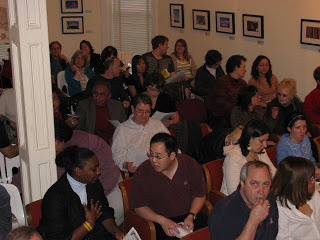
Attend these readings and book signings. Buy the book (remember Part One?). Have it signed. Talk to the poet before and after the reading, at the signing. If very few attend—a common phenomenon—stay with the poet chatting. (You will be remembered and loved for this act of charity!) Ask questions of the poet if you’re not holding up a long line, and if there is a long line, talk to the other local poetry lovers and writers in it. For the price of a book of poetry, you will get information and make contacts that will be useful in your life as a poet.
Oh. You couldn’t do that. You’re shy. Well, how will you do it at your expensive conference or workshop then? Look at this as important practice. A life in poetry is not that of an ascetic writing in an attic isolated from the world. No one will seek you out and beg to publish your work, not even if you sew them into little packets—that only worked once for an extraordinary person with a sister dedicated to her posthumous success. You want to have readings of your own, don’t you? And if you do, you want people to come to them, don’t you? Pay your dues now to support a literary community so there will be one when your time comes.
Start with online groups and listservs, if you’re shy. You can even find internet classes and workshops. You can make good friends with similar interests in online communities. You will hear about calls for submissions on many of them. These are chances to publish in special issues of journals or in anthologies that you may well otherwise never know about. Then branch out into the live world. Go to a reading. Force yourself to introduce yourself to one person there. Meet the poet. Buy the book and get it signed. Go home. See! You survived, and now you know two more people in the world of poetry.
And there you have it. Buy poetry, both books and literary journals. Read like a writer with pencil in hand, learning from the poet’s techniques and mistakes. Practice. Practice. Practice. Take part in all kinds of online, local, and national literary communities. Support other writers as you hope one day to be supported. And then start the wheel all over—read, practice, reach out and support; read, practice, reach out and support. It’s a way of life, sometimes frustrating, sometimes exhilarating, but a continuous cycle.
It’s not your business to worry about where you fall on the Majah, Minah, Mediocah hierarchy. Not that any of us can really help caring about things like reputations, of course. We can’t allow it to become important to us, though. Worrying what influential others will think of your work will cramp your writing and your own individual voice, which is really all any of us have to offer the world in the end. Your business is to read, write, find others who can teach or help you and whom you can teach or help—and keep on doing it to the best of your ability. Focus on the work. In the end, it’s always the best of us.
Just leave a comment with your email to be entered for the giveaway. This week, I'm giving away a signed hardcover Every Last Secret (finalist for the International Latino Book Award) and a signed ARC of Every Broken Trust, which publishes May 7. I'll announce the winners Monday.
Have a superb weekend!
Don't forget that all this month I have giveaways for books and other goodies taking place to celebrate the upcoming publication of my second Skeet Bannion novel, Every Broken Trust, on May 7. And if you're near the Kansas City area, join me and an interesting crowd of friends for the official launch at 6:30 p.m. on Friday, May 10, at Mysteryscape, 7309 W 80th St., Overland Park, KS.
Learning the Art and Craft of Poetry (Part Two)
You have been doing your due diligence with careful reading as a writer of the work of others. You have gained a number of techniques and craft elements that work with your individual voice and vision. You have learned a number of mistakes to watch for as you reread and revise your work. And you’re going to keep doing this. Now it’s time to add another step.
 This is the moment when conferences and workshops can be useful, now that you’ve laid a solid foundation. A good workshop can offer you the feedback and support of a group of aspiring writers. You may even make friends for life with one or more of them. In fact, that’s one of the things workshops and conferences are most useful for—the contacts and connections to the larger literary world you can make at them.
This is the moment when conferences and workshops can be useful, now that you’ve laid a solid foundation. A good workshop can offer you the feedback and support of a group of aspiring writers. You may even make friends for life with one or more of them. In fact, that’s one of the things workshops and conferences are most useful for—the contacts and connections to the larger literary world you can make at them. Big Secret: it’s possible to make similar contacts and connections without leaving home—unless you live in a rural area or very small town. (In that case, you definitely want to start saving money to go to one of the many writing conferences around the country.)
Most cities and many medium-sized towns have poetry readings and book signings, if only at local bookstores or libraries or colleges. Often it’s simply a matter of finding out what, where, and when. These are usually not well-publicized to the general public. If you do some detective work, though, you can learn about where they take place and when and who is coming. Usually you will find a mix of locals and poets from elsewhere in the country, some with national reputations. These readings may be free or ask just a nominal admission fee.

Attend these readings and book signings. Buy the book (remember Part One?). Have it signed. Talk to the poet before and after the reading, at the signing. If very few attend—a common phenomenon—stay with the poet chatting. (You will be remembered and loved for this act of charity!) Ask questions of the poet if you’re not holding up a long line, and if there is a long line, talk to the other local poetry lovers and writers in it. For the price of a book of poetry, you will get information and make contacts that will be useful in your life as a poet.
Oh. You couldn’t do that. You’re shy. Well, how will you do it at your expensive conference or workshop then? Look at this as important practice. A life in poetry is not that of an ascetic writing in an attic isolated from the world. No one will seek you out and beg to publish your work, not even if you sew them into little packets—that only worked once for an extraordinary person with a sister dedicated to her posthumous success. You want to have readings of your own, don’t you? And if you do, you want people to come to them, don’t you? Pay your dues now to support a literary community so there will be one when your time comes.
Start with online groups and listservs, if you’re shy. You can even find internet classes and workshops. You can make good friends with similar interests in online communities. You will hear about calls for submissions on many of them. These are chances to publish in special issues of journals or in anthologies that you may well otherwise never know about. Then branch out into the live world. Go to a reading. Force yourself to introduce yourself to one person there. Meet the poet. Buy the book and get it signed. Go home. See! You survived, and now you know two more people in the world of poetry.
And there you have it. Buy poetry, both books and literary journals. Read like a writer with pencil in hand, learning from the poet’s techniques and mistakes. Practice. Practice. Practice. Take part in all kinds of online, local, and national literary communities. Support other writers as you hope one day to be supported. And then start the wheel all over—read, practice, reach out and support; read, practice, reach out and support. It’s a way of life, sometimes frustrating, sometimes exhilarating, but a continuous cycle.
It’s not your business to worry about where you fall on the Majah, Minah, Mediocah hierarchy. Not that any of us can really help caring about things like reputations, of course. We can’t allow it to become important to us, though. Worrying what influential others will think of your work will cramp your writing and your own individual voice, which is really all any of us have to offer the world in the end. Your business is to read, write, find others who can teach or help you and whom you can teach or help—and keep on doing it to the best of your ability. Focus on the work. In the end, it’s always the best of us.
Just leave a comment with your email to be entered for the giveaway. This week, I'm giving away a signed hardcover Every Last Secret (finalist for the International Latino Book Award) and a signed ARC of Every Broken Trust, which publishes May 7. I'll announce the winners Monday.
Have a superb weekend!
Published on April 26, 2013 12:44
April 23, 2013
Giveaway Winners and Big News & Reviews for My Novels
 And the winners of last week's giveaway to lead up to Every Broken Trust's publication date (May 7) are Michelle Fidler, Reine Harrington Carter, and David Cranmer. I'll be sending you all emails for your postal addresses.
And the winners of last week's giveaway to lead up to Every Broken Trust's publication date (May 7) are Michelle Fidler, Reine Harrington Carter, and David Cranmer. I'll be sending you all emails for your postal addresses.Michelle has won a signed copy of Every Last Secret. Reine has won a signed ARC of Every Broken Trust. David has won an original piece of art (a noir horse sculpture).
Congratulations, guys! And thanks for joining me on the blog.
Don't forget that the giveaways continue until Every Broken Trust publishes on May 7, so anyone who comments on any post on this blog this week will be entered for a signed ARC of Every Broken Trust or signed copies of Every Last Secret or anthologies in which I've been published.
And if you're anywhere within reach of Kansas City, plan on joining me for the official launch of Every Broken Trust at Mysteryscape, 7309 W 80th St., Overland Park, KS, at 6:30 p.m. on Friday, May 10. There will be cake and wild, crazy dances of joy, and I will say a few words and sign books and send you home with kisses and hugs for coming.
I had planned to post the second part of the Art and Craft of Poetry series today, but since I've had some really nice reviews for Every Broken Trust and some great news come in recently, I thought I'd tell you all about that. I'll post the second part of the Art and Craft of Poetry series later this week.
 First of all, I'm honored to announce that my debut novel, Every Last Secret, is a finalist for the International Latino Book Award. I'm also a finalist in another category for a book I conceived and edited, Woven Voices: 3 Generations of Puertorriqueñas Look at Their American Lives, with poetry by Anita Velez-Mitchell, Gloria Vando, and Anika Paris. Lots of excitement around here last night when I got this news! The winners will be announced during the Book Expo America in New York City in May. So keep good thoughts for me, please!
First of all, I'm honored to announce that my debut novel, Every Last Secret, is a finalist for the International Latino Book Award. I'm also a finalist in another category for a book I conceived and edited, Woven Voices: 3 Generations of Puertorriqueñas Look at Their American Lives, with poetry by Anita Velez-Mitchell, Gloria Vando, and Anika Paris. Lots of excitement around here last night when I got this news! The winners will be announced during the Book Expo America in New York City in May. So keep good thoughts for me, please!And then, there are the book reviews that have started coming in for Every Broken Trust recently.
Kirkus Reviews was the first, and they said, “Skeet’s second outing showcases a strong, intelligent woman with a difficult past that keeps returning to haunt her.”
“Satisfying… Credible characters enhance the absorbing plot.”—Publishers Weekly said about Every Broken Trust.
“The first Skeet Bannion showed great promise for a series featuring a strong and complicated heroine. This sophomore effort cements Linda Rodriguez as a writer whose promise has been made good. Damn good book.”—Crimespree Magazine said just yesterday.
So I'm doing a little shameless self-promotion today, I guess, but I wanted to share my good news with my friends.
Remember, there's a new giveaway going on, so if you comment and leave your email on any post this week, you'll be in the running. Be sure to tell your friends. After all, free is good, right?
And later this week, I will post Part Two of Learning the Art and Craft of Poetry for National Poetry Month. I hope you're all having as nice a week as I am!
Published on April 23, 2013 13:50
April 18, 2013
Learning the Art and Craft of Poetry (Part One)
Several years ago, I was asked to write a two-part series of essays for Nilki Benitez's blog on how to learn the art and craft of poetry, especially if the reader couldn't afford to attend academic workshops and big writers conferences. I decided I'd repost those essays here for National Poetry Month since I think that information is still valid, and I get questions about this often.
Learning the Art and Craft of Poetry (Part One)
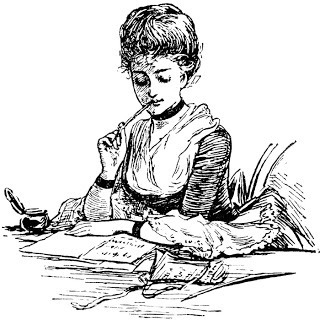
As a first step, I’ve compiled a list of poets. This is not an exhaustive list of all the poets I like or turn to for inspiration or education. This is not a ranking of the “best” poets. I’m not much on the Majah, Minah, Mediocah hierarchy game. These are wonderful, gifted poets to whom I do turn for inspiration, education, and pure pleasure and whose names came to me as I was thinking of this list. There are other poets who have been and are important to me who didn’t necessarily rise to the top as I was pondering this list, such as Sappho, Shakespeare, Donne, Whitman, Dickinson, and many fine contemporary poets. And that’s okay. This list is simply a place to start.
This is what I always tell my students when I teach writing poetry. A serious poet should be reading poetry all the time. My husband is a publisher, and I have worked as an editor. We are always surprised by all the poets who want to publish so that others will read their work, but they don’t buy or read anyone else’s work. They will spend a fortune on workshops, conferences, contests, and reading fees, but they buy hardly any books by other poets. If you’re on a tight budget, forget the classes and conferences for a while and buy the work of fine, contemporary poets or those in the generation just past—and the wonderful classic geniuses of the distant past. Buy them so you can reread and mark them up, figuring out how they do the incredible things they do and how they made the mistakes they made that you want to avoid. Do this first of all, before the classes, workshops, conferences, etc.—all of which are good things but not as critical as this. Any kind of serious writer must be a serious reader first.
This little list is a relatively random list of some people whose work speaks to me, in no particular order. When I read their work, I think about some part of it or all of it, “Wow! I wish I could do that! How do they do it?” A good poet doesn’t steal the work of another poet, but we all steal techniques and make them work for our own idiosyncratic voices. None of these poets writes the way I do, but I have learned some craft element or technique from all of them (as well as from many others). If you read these poets carefully, looking at how they achieve their effects, I guarantee you’ll find something that will advance your own poetry. Then you can branch out to the many other fine poets who can serve as models and teachers.
A Few Poets to Read with Care and Serious AttentionLinda HoganLucille CliftonLuci TapahonsoDenise LevertovDiane GlancyLucille CliftonAdrienne RichDeborah MirandaMary OliverPablo NerudaSimon OrtizWilliam Carlos WilliamsAllison Hedge CokeGwendolyn BrooksElizabeth BishopRichard BlancoSandra CisnerosMarjorie AgosínSherwin BitsuiTrish ReevesBrenda CárdenasLisa AlvaradoCraig Santos PerezKristin NacaH.D.Alice FrimanSherman AlexieMarilyn KalletRobert Duncan
So, Step One is to get thee to a bookstore and buy some of these poets’ works as well as others you want to learn from.
Step Two is the act of reading the poems like a writer reads. First, of course, you’ll read them for the pleasure of reading them, but even in this first reading, you’ll pay attention to what gives the most pleasure. Mark it as you read. Just as importantly, mark the places where the poet loses you, where your interest or involvement wanders, where you find yourself confused. These can be as important to your own writing. Your later reading of this poet and book will involve attempts to figure out how this poet does the marvelous stuff—what makes this part so-o-o-o good—and how this poet weakened her/his own work—why this part isn’t as good as the rest.
If you’re like me and a lot of other poets I’ve known, just the act of this first reading with that kind of attention will set you writing. That’s one of the joys of reading for a poet. If you feel you suffer from writer’s block, start reading poetry with deep, close attention to what the poet is doing right and wrong. You will almost always find yourself writing your own poems in response or as a variation or just somehow inspired. This is always good, but it’s not nearly the end.
 Go through that poet’s book again, looking for those marked areas and rereading them carefully, trying to figure what exactly this poet did to make it so good—was it his diction, her use of alliteration and assonance, their line breaks/internal rhyme/connecting images?—and why this poet didn’t quite make it at this point—was it his use of abstract language, her lack of attention to the line’s rhythm?—and mark it in the book and write about it in more detail in your journal. This poet is your teacher. Learn everything you can from her or him. Then go practice some of those good techniques in your own poetry. What works with your own voice and vision and what doesn’t? Also, pick up some of your old poetry and look for those mistakes you identified in the poet’s book in your own work. Can you see them where you didn’t notice them before? Can you rewrite and make those points stronger, more vivid?
Go through that poet’s book again, looking for those marked areas and rereading them carefully, trying to figure what exactly this poet did to make it so good—was it his diction, her use of alliteration and assonance, their line breaks/internal rhyme/connecting images?—and why this poet didn’t quite make it at this point—was it his use of abstract language, her lack of attention to the line’s rhythm?—and mark it in the book and write about it in more detail in your journal. This poet is your teacher. Learn everything you can from her or him. Then go practice some of those good techniques in your own poetry. What works with your own voice and vision and what doesn’t? Also, pick up some of your old poetry and look for those mistakes you identified in the poet’s book in your own work. Can you see them where you didn’t notice them before? Can you rewrite and make those points stronger, more vivid?
 Follow this regimen with the other books you bought. These first two steps give you a foundation that nothing else can. And the plus side of this course for women (and men) with small children, large families, demanding jobs/spouses, is that you can do it quietly in bits and pieces of time without having to go away to some conference or university program.
Follow this regimen with the other books you bought. These first two steps give you a foundation that nothing else can. And the plus side of this course for women (and men) with small children, large families, demanding jobs/spouses, is that you can do it quietly in bits and pieces of time without having to go away to some conference or university program.
In Part Two, we’ll move on from these steps, but most really good poets return to them all the time, no matter how many books and awards they have. These are the poet’s version of the pianist’s scales or the dancer’s daily practice. Don't forget that all this month, I'm giving away books and pieces of art to randomly selected commenters on this blog. So leave a comment with your email if you want to be entered for this week's giveaway.
Learning the Art and Craft of Poetry (Part One)

As a first step, I’ve compiled a list of poets. This is not an exhaustive list of all the poets I like or turn to for inspiration or education. This is not a ranking of the “best” poets. I’m not much on the Majah, Minah, Mediocah hierarchy game. These are wonderful, gifted poets to whom I do turn for inspiration, education, and pure pleasure and whose names came to me as I was thinking of this list. There are other poets who have been and are important to me who didn’t necessarily rise to the top as I was pondering this list, such as Sappho, Shakespeare, Donne, Whitman, Dickinson, and many fine contemporary poets. And that’s okay. This list is simply a place to start.
This is what I always tell my students when I teach writing poetry. A serious poet should be reading poetry all the time. My husband is a publisher, and I have worked as an editor. We are always surprised by all the poets who want to publish so that others will read their work, but they don’t buy or read anyone else’s work. They will spend a fortune on workshops, conferences, contests, and reading fees, but they buy hardly any books by other poets. If you’re on a tight budget, forget the classes and conferences for a while and buy the work of fine, contemporary poets or those in the generation just past—and the wonderful classic geniuses of the distant past. Buy them so you can reread and mark them up, figuring out how they do the incredible things they do and how they made the mistakes they made that you want to avoid. Do this first of all, before the classes, workshops, conferences, etc.—all of which are good things but not as critical as this. Any kind of serious writer must be a serious reader first.
This little list is a relatively random list of some people whose work speaks to me, in no particular order. When I read their work, I think about some part of it or all of it, “Wow! I wish I could do that! How do they do it?” A good poet doesn’t steal the work of another poet, but we all steal techniques and make them work for our own idiosyncratic voices. None of these poets writes the way I do, but I have learned some craft element or technique from all of them (as well as from many others). If you read these poets carefully, looking at how they achieve their effects, I guarantee you’ll find something that will advance your own poetry. Then you can branch out to the many other fine poets who can serve as models and teachers.
A Few Poets to Read with Care and Serious AttentionLinda HoganLucille CliftonLuci TapahonsoDenise LevertovDiane GlancyLucille CliftonAdrienne RichDeborah MirandaMary OliverPablo NerudaSimon OrtizWilliam Carlos WilliamsAllison Hedge CokeGwendolyn BrooksElizabeth BishopRichard BlancoSandra CisnerosMarjorie AgosínSherwin BitsuiTrish ReevesBrenda CárdenasLisa AlvaradoCraig Santos PerezKristin NacaH.D.Alice FrimanSherman AlexieMarilyn KalletRobert Duncan
So, Step One is to get thee to a bookstore and buy some of these poets’ works as well as others you want to learn from.
Step Two is the act of reading the poems like a writer reads. First, of course, you’ll read them for the pleasure of reading them, but even in this first reading, you’ll pay attention to what gives the most pleasure. Mark it as you read. Just as importantly, mark the places where the poet loses you, where your interest or involvement wanders, where you find yourself confused. These can be as important to your own writing. Your later reading of this poet and book will involve attempts to figure out how this poet does the marvelous stuff—what makes this part so-o-o-o good—and how this poet weakened her/his own work—why this part isn’t as good as the rest.
If you’re like me and a lot of other poets I’ve known, just the act of this first reading with that kind of attention will set you writing. That’s one of the joys of reading for a poet. If you feel you suffer from writer’s block, start reading poetry with deep, close attention to what the poet is doing right and wrong. You will almost always find yourself writing your own poems in response or as a variation or just somehow inspired. This is always good, but it’s not nearly the end.
 Go through that poet’s book again, looking for those marked areas and rereading them carefully, trying to figure what exactly this poet did to make it so good—was it his diction, her use of alliteration and assonance, their line breaks/internal rhyme/connecting images?—and why this poet didn’t quite make it at this point—was it his use of abstract language, her lack of attention to the line’s rhythm?—and mark it in the book and write about it in more detail in your journal. This poet is your teacher. Learn everything you can from her or him. Then go practice some of those good techniques in your own poetry. What works with your own voice and vision and what doesn’t? Also, pick up some of your old poetry and look for those mistakes you identified in the poet’s book in your own work. Can you see them where you didn’t notice them before? Can you rewrite and make those points stronger, more vivid?
Go through that poet’s book again, looking for those marked areas and rereading them carefully, trying to figure what exactly this poet did to make it so good—was it his diction, her use of alliteration and assonance, their line breaks/internal rhyme/connecting images?—and why this poet didn’t quite make it at this point—was it his use of abstract language, her lack of attention to the line’s rhythm?—and mark it in the book and write about it in more detail in your journal. This poet is your teacher. Learn everything you can from her or him. Then go practice some of those good techniques in your own poetry. What works with your own voice and vision and what doesn’t? Also, pick up some of your old poetry and look for those mistakes you identified in the poet’s book in your own work. Can you see them where you didn’t notice them before? Can you rewrite and make those points stronger, more vivid? Follow this regimen with the other books you bought. These first two steps give you a foundation that nothing else can. And the plus side of this course for women (and men) with small children, large families, demanding jobs/spouses, is that you can do it quietly in bits and pieces of time without having to go away to some conference or university program.
Follow this regimen with the other books you bought. These first two steps give you a foundation that nothing else can. And the plus side of this course for women (and men) with small children, large families, demanding jobs/spouses, is that you can do it quietly in bits and pieces of time without having to go away to some conference or university program.In Part Two, we’ll move on from these steps, but most really good poets return to them all the time, no matter how many books and awards they have. These are the poet’s version of the pianist’s scales or the dancer’s daily practice. Don't forget that all this month, I'm giving away books and pieces of art to randomly selected commenters on this blog. So leave a comment with your email if you want to be entered for this week's giveaway.
Published on April 18, 2013 14:09
April 15, 2013
Winners and a new giveaway!
The winners of last week's blog contest were Laura Hoopes and Mary Marino-Strong. Laura won a signed ARC of Every Broken Trust, and Mary won a signed copy of Feeding Kate, a mystery anthology in which I have a short story. You both have an email from me, asking for your mailing addresses in your inboxes.
This week, I'm starting a new giveaway for ARCs, other books, and some small pieces of original art. So any comments on blog posts this week will be eligible for these.
And I've got a post up on Writers Who Kill today about the way characters and events become real to readers and how that affects our brains.
http://writerswhokill.blogspot.com/20...
Second bit of news--after a weekend symposium of The Native Presence in Kansas Literature, I came home to find the first actual copy of the hardcover Every Broken Trust. It's even more beautiful than the cover image, but I can't take a photo of it because my new Android phone needs a memory card before it can take pictures. *sigh* So I'll give you the cover image again. Just know it's even more gorgeous in actuality!

Come visit me at Writers Who Kill. Leave a comment here with your email address, and you'll be entered for this week's giveaway. Have a grand week!
This week, I'm starting a new giveaway for ARCs, other books, and some small pieces of original art. So any comments on blog posts this week will be eligible for these.
And I've got a post up on Writers Who Kill today about the way characters and events become real to readers and how that affects our brains.
http://writerswhokill.blogspot.com/20...
Second bit of news--after a weekend symposium of The Native Presence in Kansas Literature, I came home to find the first actual copy of the hardcover Every Broken Trust. It's even more beautiful than the cover image, but I can't take a photo of it because my new Android phone needs a memory card before it can take pictures. *sigh* So I'll give you the cover image again. Just know it's even more gorgeous in actuality!

Come visit me at Writers Who Kill. Leave a comment here with your email address, and you'll be entered for this week's giveaway. Have a grand week!
Published on April 15, 2013 07:27
April 12, 2013
Poem for National Poetry Month--"Apache Dance in Loose Park"

One of Kansas City's premier parks is Jacob Loose Memorial Park just south of the famous Kansas City Country Club Plaza. In this poem, it becomes a setting for an exploration of destructive passion and love late at night in the dead of winter. There are great loves that are not good loves or smart loves. Sometimes they turn deadly. Sometimes--if we're very lucky--we barely escape such loves with our skins intact, though hearts may be broken.
APACHE DANCE IN LOOSE PARK
The man and woman in the frozen park at midnight are crazy. See them dance—come together, her eyes spitting, his aware of his sin. Watch her rigid stance melt and his slouch turn fierce. With choreographed impulse, her hand extends to touch his cheek. He jerks away in pain or something rougher. Her shoulders sag, then square themselves and shrug. She pivots, ready to leave. Now he reaches out, spins her around, draws her close. She struggles against his arms and chest, hands fluttering, while he drags her off the spotlit sidewalk. Watch her glance at the dark bushes, then at the strange hate in his face. See how grim her own grows, how she tosses her head toward the night, as if to say, “Go ahead. Get it over with. Rape me, kill me, end it somehow. You can’t want that any more than I do.” Now his face softens. Once more she tries to touch. He sways away from her outstretched fingertips.

They’re crazy. Listen to her laugh, twisting loose and whirling away from her opponent in the dance or war they’ve staged here where all breath is visible under the streetlamps. How fast she runs to her car and leaves. How unprepared for this step he is. He can’t reach out to stop her until her car is rolling down the drive. In the rearview mirror, she will see his hand lift, his mouth open, his face twist, and she will notice what a stranger he is, older and fatter and sadder than she realized. She will stop for coffee and doughnuts and warmth, sit coughing and shivering alone and hate every man who eyes her. He will clutch his chest alone under the streetlamp, bowing to the audience of tree and frost, then stumble, suddenly blind, to his car and drink himself to bed, only to dream of shrubs hiding blood and bruised flesh on the frozen ground, of how a man can come so close to killing what he loves.
Published in Heart’s Migration(Tia Chucha Press, 2009)
Don't forget to comment on the post before this one to be entered for a chance to win a signed ARC of my forthcoming novel, Every Broken Trust, and other books and goodies. I'll draw on Sunday and commence a new contest on Monday.
Published on April 12, 2013 10:03
April 9, 2013
One Month Away--EVERY BROKEN TRUST
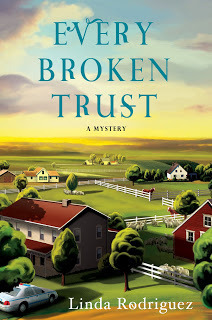
My second Skeet Bannion novel, Every Broken Trust, will be published in less than a month on May 7. To celebrate that, for the next month, I’ll be giving away ARCs of Every Broken Trust and other goodies, including small pieces of original art, to people who comment on my blog and are selected at random. Starting today. I’ll send an ARC to someone who comments this week on the blog and leaves an email. I’ll also be giving away other goodies to commenters this week, so be sure to check back.
I’m excited about this book. Publisher’s Weekly called Every Broken Trust “satisfying” and said, “Credible characters enhance the absorbing plot.” Kirkus Reviews said, “Skeet’s second outing (Every Last Secret, 2012) showcases a strong, intelligent woman with a difficult past that keeps returning to haunt her.”
In Every Broken Trust, life has settled into routine for half-Cherokee Marquitta “Skeet” Bannion now that she’s gained custody of fifteen-year-old Brian Jameson and shares care for her stroke-impaired father with her ex-husband—until the past reaches out to destroy everything she holds dear. A party to celebrate the arrival in Brewster, Missouri, of George Melvin, a Kansas City politician accompanied by his troubled teenage daughter, wealthy wife, even wealthier backer, and mysterious employee, rapidly turns into disaster when Skeet’s best friend, Karen Wise, stumbles on a body in Chouteau University’s storage caves and is attacked herself. Skeet works to keep Karen safe, even as Karen becomes obsessed with the dead man’s drunken claim that her husband’s accidental death years earlier was murder.
Brian’s emotional entanglement with the rebellious daughter and Karen’s fixation on the politician as her husband’s murderer frustrate Skeet’s efforts to keep them both safe and out of trouble while she tracks down the killer, who’s targeting Karen to remove a potential witness. Even Skeet’s friends and neighbors in Brewster keep secrets from her, and Skeet wonders if any of them are what they seem. Not knowing who she can trust any longer, Skeet struggles against the clock to solve a series of linked murders stretching into the past before she loses Brian forever and her best friend winds up in jail—or dead.
And here’s a sample of the book. If you want a chance to win an advance reading copy and other swag, leave a comment below with your email.
Every Broken Trust
Top of Form CHAPTER 1
“This won’t work!” I slammed the door to Forgotten Arts behind me, shutting out stifling late-August heat. Ignoring the bell swinging on red handspun, I glared at Karen Wise, who was hosting a party at my house because her farm was too far from town. She promised I just had to make my house available and show up. I’m not a party-giving woman. Now, I was hosting a welcome party for the new dean of Chouteau University’s law school.
Karen looked up from spinning the fluffy mass of gray wool into yarn, stopped the wheel, and wound a strand of wool over a peg, taking her time as I fumed. Normally, I enjoyed the spinning wheels and looms around us. I bought colorful yarn and fondled fiber from sheep, goats, and alpacas. This Thursday, I wanted to throw things.
“Lunchtime, Skeet,” Karen announced in her usual mild tones.
“How many more did you invite to this ‘little’ party?” I tried not to grind my teeth. “You’re out of control.”
Smiling, Karen strolled over to the wall, plucked a filmy lace shawl from a peg, and threw it over her sundress. “Look in the mirror for the out-of-control person.”
I huffed. “You’re not sticking to our agreement.”
Just before leaving my office at Chouteau University, I received more RSVPs for Sunday evening. I’d ask her to stop inviting people, reminding her she promised just a few. Then, more RSVPs would roll in, leaving me livid, Karen calm and cool.
She stepped to my side, taking my arm with a smile. I looked down at her dark, serene face. Years as a therapist had taught her to keep her countenance under control. I resented the heck out of it. “They’ll be waiting. You really don’t want to see Annette when she’s had to wait for lunch.”
I sputtered in exasperation. Karen laughed, tugging me toward the door. By the time we walked in blistering sun and thick air across the town square to the Herbal Coffee Shop, I was resigned. Sunday night would be a disaster, my house packed with people I didn’t know. The university carillon played its on-the-hour measure of Bach, sounding like a dirge.
“Sometimes,” I muttered.
“Perhaps,” she said. “But not now. Mel was Jake’s best friend. Many of these people were his friends. You’ll do it for Jake.”
I’d do this miserable party. For her late husband’s sake—and Karen’s.
Entering the Herbal’s air-conditioning was a relief. The cooler air filled with scents of mint, lemon balm, and angelica drained the last of my anger. Dolores Ramirez, the owner, and her college-student waitresses bustled back and forth between kitchen and tables, carrying plates of food, herbal iced tea, and fresh lemonade. Enough to calm any temper.
Maybe I was just irritated by Missouri’s late-summer heat. Maybe I’d hide out from the party in the kitchen, playing video games with my fourteen-year-old ward.
“Over here. We already ordered.” Annette Stanek waved us to the corner table she and Miryam Rainbow shared. Annette, a tall, heavy redhead, looked elegant next to Miryam, a blond former model.
Once settled in, I ordered curried chicken salad, and Karen ordered herbed walnut-quinoa salad. Annette and Miryam had already been served the special, Asian peanut slaw.
A scrawny old guy with a red-veined face called, “Karen.” He trudged over from the doorway, calling her again.
Karen muttered, “What’s he doing here?”
“Who?” I asked.
Karen faced me. “Leonard Klamath. I wouldn’t know him, if I hadn’t run into him at a fund-raiser. Amazing the damage alcohol causes.”
The man looked thirty years older than he had four years earlier when Jake died. This man could be that Leonard’s father.
He shuffled to the table. “I want to talk, Karen. Been thinking about this.”
“Leonard, sit down. Can we pull up another chair?” Karen placed her hand on his arm, looking into his worn face with concern.
I stood automatically, pulling an empty chair from the next table. “Here you go.” I pushed it from behind to help him into it. He looked disturbed. I wondered what happened to the man I used to know.
“Skeet? What are you doing here?” He peered into my face, frowning.
“She lives here now. I finally talked her into it.” Karen sounded and looked self-satisfied.
Leonard examined my face as if not sure I was really Marquitta “Skeet” Bannion. “Do you commute?”
“No, I left KCPD. I’m chief of Chouteau University’s police department.” My voice held a little defensive stiffness. I made a good decision for my life, but most folks I knew as a homicide detective and administrator with KCPD saw my move as a step or three downward.
“You still a cop?” Leonard struggled to his feet again.
“Always. You know me.”
He nodded. “What else could you be? Big Charlie Bannion’s daughter.”
I cringed. That’s what I’d fled—always being Big Charlie Bannion’s daughter, living in his shadow, tied to his name and his mistakes. Here in Brewster, no one knew Charlie. I could be myself, unshadowed.
Karen tugged at his sleeve. “Sit back down. You don’t look well. You want to talk to me. What is it?”
He brushed off her hand. “Changed my mind. We can talk Sunday. Can’t we?”
Karen looked puzzled. “Yes, but … If you want privacy, we can go to my shop.”
Leonard shook his head, looking at me rather than Karen. Frightened. He wasn’t when he arrived. Just determined.
“No. Gotta go back. See you Sunday.” He exited faster than he’d entered.
“Why did he change his mind?” Karen mused.
“Looked like he was scared of Skeet.” Annette gave me a long look. “Did you do something to him?”
I threw up my hands. “Not that I know of. We got along fine when he worked with Jake.”
“Of course you did.” Karen shrugged. “I’ll find out Sunday night.”
“Leonard’s coming to this party, too?” I tried to keep bitterness out of my voice.
“Are you two still fussing over that?” Miryam took a big bite of salad.
Annette gave me a disgusted look. “No one would guess you’re best friends. All over a party.”
“We’ve made up,” Karen said. “It’s all good.”
I tried to look like it was all good. “Change the subject.”
“I know.” Miryam bounced with delight. “Annette told me about this new mystery she read with a woman detective who’s a sniper in the army.”
I smiled. “They don’t allow women snipers in any of the services.”
Karen’s laugh was deep. “Maybe she’s a sniper in the Israeli army? Women do everything there.”
“They let women go into danger over there?” Miryam asked.
“We let them here,” Annette said. “Look at Skeet. Women police officers go into danger every day. It can be as dangerous on a city’s streets as any war zone.”
The waitress brought Karen’s lunch and mine to the table. Behind her stood Reverend Matt Lawson, waiting to get to his own table. He smiled, nodded as our eyes met, then moved on as his path opened.
“There’s someone who could tell you about women in the military.” I indicated Reverend Matt with my head. I’d grown up with folks who believed pointing a finger directed power. Rude and dangerous.
“He was a chaplain, wasn’t he?” Miryam watched Reverend Matt join his wife, Helen. “I’ve never figured out why such a handsome man married such a plain woman.”
We all looked at Matt with his thick auburn hair going slightly white at the temples and his clean-cut features with soft, full lips. Next to him sat Helen, ex-nun, graying dishwater-blond hair hanging limp to her shoulders, prominent nose, the rest of her features faded. Yet as she spoke, passion behind her words animated her face, making her look more alive than anyone in the room.
“It’s not all about looks.” Karen frowned. “Helen has lots of charisma.”
“Before he became a minister, Matt was a Ranger in Somalia and Bosnia,” I added.
“Black Hawk Down?” Miryam’s voice rose. “They should have had him in the movie. He’s better-looking than any of the actors. Except Orlando Bloom.”
Karen made a disgusted sound. “When will you learn life’s more than appearance?”
“How’d you hear this?” Annette stiffened. “I’m on the First Methodist council and didn’t know.”
“River running early in the morning. We’re not always out on the same days, but often enough we stop to compare battle stories. He downplays what he did overseas. I Googled him. He was given medals. I don’t think he likes what he did as a Ranger. Modest man.”
“I can see why he wouldn’t want to publicize any killing he had to do as a soldier,” Annette said.
“If it was like the movie, he had to do a lot of killing,” Miryam said in a cheerful voice and took another bite of slaw.
I smiled at Annette. “He’d agree with you that city streets are as dangerous as a war zone.”
“Don’t you miss the excitement of the streets?” Annette lifted her chin, examining me.
“Gran always said, ‘Happy’s lots better than exciting.’ Now that I’m older, I agree.” I took a bite of chicken salad.
“Still, your days here aren’t full of action like when you tracked down murderers in Kansas City,” Annette said wistfully.
“What about when she tracked down that murderer here last spring?” Miryam turned to me with an excited smile. “Maybe we’ll start having them all the time, like the city.”
I shuddered. “I can do without that.”
“Miryam, someone has to die for a murder.” Karen raised an eyebrow. “Maybe it should be you. Think of the excitement as you breathe your last.”
Annette laughed. Miryam stuck out her tongue.
I choked back laughter. “No, thanks.”
“Surely you miss the adrenaline from the streets!” Annette pointed her fork at me.
I shook my head. “That life was as boring as anything here and much more stressful. Even working Homicide, which I do miss, was nothing like your mystery novels.”
Annette stabbed her salad. “What’s the good of having a real police detective as a friend if she’s as boring as I am?”
“She’ll find the killer if someone murders you,” Miryam said with satisfaction.
Karen and I laughed. Annette pinched her mouth in exasperation.
“I promise to track down and imprison your murderer.” I laid my hand over my heart.
Karen shuddered. “Someone’s walking on my grave.”
I sat back as we continued to joke with one another. In Kansas City, I had few women friends. Since I worked mostly with men, my friends wound up being male cops. Here, Karen made me part of this group. My decision to relocate was paying off.
A short time with friends swept away my irritation. Still, the party hung over me like a distant threat.
* * *
At day’s end, I headed for my Crown Vic, fitted out with radios for city and campus police systems and a twelve-gauge shotgun. Not exactly a family car. Still, I was picking up my ward, Brian Jameson, from after-school tutoring. Thunder growled in the west. I stopped halfway to the car to see if a storm would finally bring us needed rain, but the air was thick and heavy, no promise of rain in its burned scent. In the distance, I heard a train, Brewster’s daily background music. Lightning flickered way across the Missouri River. I got in the car, throwing my briefcase in back with a frustrated sigh. Another false promise.
When I pulled up at the entrance to Ormond, Brian darted out of the air-conditioned building into the car, slinging book bag and flute case into the back.
“Watch that!” I ducked his backpack. “How was class?”
“We’re getting into real cool stuff. Pentatonic scale used in tribal folk music.” Brian leaned back against the seat. “It doesn’t look like much. So short. Professor Garton says it shows what you do, even with simple materials, makes art—not the materials themselves.”
“Sounds good.” I tried to sound interested.
Garton taught the university’s music students. He tutored Brian because he thought Bri, a gifted flautist and promising composer, could get a scholarship to Juilliard. He told me working with Brian made up for the dull students he had to teach. I’d have been one of those students, but Brian always came from class excited.
He chatted about his day as I drove College Hill Road’s narrow twists. Where it ran into Girlville (name given before the college turned coed), I turned left to the town square with its courthouse surrounded by beds of purple coneflowers and black-eyed Susans. In the old days, I wouldn’t have known the flowers. My new life had turned me into a gardener, dog owner, and—well, mother might be too strong a word.
Once parked, we walked past shops as a train rumbled through town. We waved at Bob and Kathy Lynch on their B and B porch and hurried past, trying to get to Pyewacket’s before the wait became too long. I cooked at home more now that Brian lived with me. Simple food, pleasing to a fourteen-year-old. When I didn’t want to hassle with it, we went to Pyewacket’s.
Inside the restaurant, Pal Owens put names on a waiting list, long gray ponytail cascading down his back. Pal always wore tie-dyed T-shirts and bellbottom jeans with Birkenstocks. His wife, Sandi, supervising the kitchen and wait staff, wore the same.
The Owens kept themselves and the décor of Pyewacket’s locked in the sixties. The food, however, was twenty-first-century. Basil-tomato tartlets with lemon balm bread. Broccoli-potato torte with chives. A nice change from my cooking.
“Brian, Skeet, how’s it shaking?” Pal asked.
“How long’s the wait?” I looked at the crowd without much hope.
He ran his eye down the list. “Thirty minutes. Jumping tonight, babe.”
I sighed. “Put us down.”
“Sure thing.” He scribbled my name and greeted the couple behind us.
I stepped back, and Joe Louzon’s daughter Julie waved us to a place next to them. Waving back, Brian headed over.
Eleven-year-old Julie had her golden brown hair skinned back from her round face in a ponytail with several long strands hanging down, escaped from the elastic. Her mother had left her and Joe when Julie was a toddler, but Julie always seemed happy, no hidden shadows. Now, shadows appeared in that little face from her ordeal earlier in the year. Brian’s face and even mine held shadows from the same incident. Karen was helping us all make it through the shadows.
“How’s your day been, Skeet?” Joe said.
I shrugged. “Karen’s inviting crowds to a party at my house that I don’t want to give. The faculty senate wants me to stop building the desperately needed parking structure and give the money to them for European junkets. The half-hour wait to get in here’s just frosting on the cake.”
“We should be called next,” Julie said in an enthusiastic voice. “You can eat with us. I’ll tell Pal.”
She darted away on her errand of mercy, ponytail bobbing at waist level through the crowd. I took a deep breath of air filled with rosemary, garlic, and sizzling meats and began to relax.
“You know Julie,” Joe apologized. “She’d love to eat with you. She never stops to think you might not feel the same.”
Brian laughed. I smiled at Joe. “It’s okay. Company for dinner sounds good, doesn’t it, Bri?”
Brian nodded. “It’ll feel more like a family.”
I stiffened. Wasn’t I giving him a real family experience? I wasn’t much good at family stuff, never had been. But I was trying to do my best for him.
“I always wanted a sister,” Brian went on. “When we’re all together, it feels like a TV family.”
“I feel the same way, Brian.” Joe smiled at him, not looking at me. He wanted a relationship but didn’t pressure. One of many things I appreciated about him.
Julie dodged back through the crowd. “Pal says no prob.” She giggled. “I love his old slang. Groovy. It’s so fun coming here. Like walking into a sitcom.”
I nodded. “I come for the food, but the hippie thing’s amusing. Even if it’s before my time.”
“Louzon, party of four,” Pal called out, and we walked over. “Way to go, man. You and Brian have the foxiest chicks here tonight, Joe.”
As we followed the waitress, Julie giggled. “Foxy chicks. Way to go, man.”
I winked at her. “Don’t make fun of your dad’s time period. You shouldn’t hurt his ancient feelings.”
Julie giggled. Brian grinned. Joe assumed a look of pain. “That was my older brothers’ time. I was a toddler.”
Laughing, we settled into our booth, Brian sliding in next to me, with Joe and Julie across from us. I felt the day’s tension melt away. Once the waitress left with our order, Joe told a funny story about breaking up a fight between Art Williamson and Bea Roberts. Bea and other upscale shop owners had been trying to get Art’s working-class bar off the square for years. Their verbal brawls were legendary.
Our food arrived. I started on salmon-lentil salad. Brian munched a steakburger with onion strings, and Julie nibbled chicken fricassee with mashed-potato cakes while Joe ate orange-steak kabobs on rice pilaf. A waitress led four people in and seated them across the room.
“There’s the source of all my troubles.” I tipped my chin toward the group and realized I’d avoided pointing my finger again.
“Who?” Joe asked.
I looked at the lone woman in the group. The first time I’d seen her in person. I’d heard way too much about her. I nodded in her husband’s direction. “George ‘Mel’ Melvin, former U.S. attorney for Western Missouri. Failed candidate for Missouri attorney general. New dean of the law school. The reason Karen’s stuffing my house with people Sunday night. I wish to heck he’d stayed in Kansas City.”
“Which one is he?” Brian asked.
“The stocky one with the wife who looks better than any model. She can afford to. She’s richer than anyone, except the tall guy.” With a sigh, I turned to slather butter on my lemon balm bread.
“Who is she? Who’s the tall guy?” asked Joe. “And that long-haired tough guy?” Intently, he checked them out, small-town police chief pondering new residents and the troubles they might bring.
“The tall guy’s Walker Lynch. Millionaire. Still lives in Kansas City, last I heard. He and Mel are tied politically. I don’t know the dark bad boy. Bodyguard, maybe.”
Joe nodded. “He’s got the look.”
“The woman’s Liz Richar. Stovall banking, real estate,” I said. “MidAmerica United and L. J. Stovall Properties. Her mother was Stovall’s only kid. She married Gard Horner. Horner Petroleum. Not as rich as Stovall but up there. Whole family’s dead and little Lizzie’s everyone’s heir. Never met her. Just seen her on the news. She’s involved in politics.”
Julie stared at the quartet. “She’s beautiful!”
“Skeet’s better-looking,” Brian tossed in loyally.
I grinned. “It’s okay. I’m nowhere near her class. I know it.”
“Some of us prefer our women more natural, don’t we?” Joe smiled at him.
Brian nodded. “She looks plastic.”
“This guy Lynch? What’s the scoop?” Joe asked.
“Big philanthropist. That’s how I know him. He supports causes I worked for. Met him at events and on boards. Shelters for the homeless, runaways, domestic violence. He gives tons of money. The kind of rich person I’d want to be.”
Joe nodded. “A good guy.”
“How are they a problem for you, Skeet?” Julie asked.
Brian jumped in before I could answer. “Karen’s giving the new dean a party. At our house, ’cause she’s out in the boonies. Skeet said yes.”
“Not knowing the ‘few people’ she mentioned would balloon.”
“You could have said no.” Brian’s face was stern.
I shook my head. “I couldn’t really.”
“Why not?” Julie asked.
I stared at Mel again. “Karen’s husband, Jake, worked for Mel. They were friends.”
Joe looked at me. “The dead husband?”
I nodded. “She says Jake would have given the party.” I shrugged. “I don’t think Karen likes Mel much since he dumped his first wife to marry Liz. But she’s sure Jake would want this, so…”
Joe quirked an eyebrow at me. “As Brian mentioned, you could have said no.”
I looked away. “Jake and Karen sort of adopted me when I first came up from Oklahoma to the academy. My dad wasn’t happy about it. I was all alone. They were my support system.” I looked back at him. “Jake would have given Mel a big party to introduce him to folks in his new town. I couldn’t say no.”
Brian tapped my shoulder. “So quit fighting with Karen about it. After Sunday, it’s over.”
“The hostess with the mostest,” Joe muttered.
“She’s supposed to handle all the work. I’ll hold her to that, no matter how many hundreds of people she invites to my house.” I put a melodramatic frown on my face and folded my arms in front of me, doing my best bad-gangster impression.
They laughed. I joined in. We ate the delicious food, talking and laughing. As I savored the mix of flavors in my salad, the cloud of dread over the party moved out of my mind.
The kids ordered dessert. Joe and I decided on coffee. As Julie ate her orange pound cake à la mode and Brian dug into his hot fudge sundae, I settled back into my seat next to Brian, feeling content, unwilling to move.
Walker Lynch and his shadow moved into my view, stopping at our booth. “Skeet! Are you in Brewster now?”
“Walker.” I nodded. “More than a year.”
“Is it your house we’re going to Sunday night? I heard Karen’s party was at someone else’s house.” Walker took in Joe and the kids, and one of his eyebrows rose slightly.
“Karen’s your hostess. I’m not the Martha Stewart type myself.”
He chuckled. “I wouldn’t have thought so. But then Martha’s not a decorated homicide detective.”
The hard-muscled guy with black hair, mustache, and goatee leaned forward to inspect me closely.
I smiled. “Walker Lynch, this is Joe Louzon, Brewster’s chief of police, and his daughter, Julie. This is my ward, Brian Jameson.”
Walker’s brows lifted again at Brian’s introduction. “You, a family woman? That’s unexpected.”
“Skeet’s a great family woman,” Brian said sullenly.
Joe’s jaw tensed. “Skeet does a terrific job as a parent. In a few more months, Brian’s adoption will be final. She’ll be his mother.”
Walker held up his hands in defense. “I meant nothing negative. It’s simply not a role I’d ever seen Skeet in. It surprised me.”
I laughed softly. “It surprised me, too, but I try to do my best. Brian’s forgiving of my errors.” I smiled at Brian. “We landed together by accident, but we do pretty well.”
He reached for my hand under the table and squeezed it. “We make a great family.”
“One of the best I’ve seen,” Joe added.
Walker laughed and pulled the dangerous-looking guy farther forward by the arm. “I don’t think you’ve met my associate Terry Heldrich.”
I extended my hand to shake his. “No, I haven’t.”
Terry took my hand in a firm grip and stared into my face. His high cheekbones and straight slash of nose separating large, dark eyes could have belonged to any of my uncles or relatives down in Oklahoma. He was more alert than anyone I’d ever seen, almost canine in his awareness, like a highly trained guard dog hearing higher frequencies and smelling scents that passed the rest of us by.
“What do you do in Walker’s company?” I asked, making conversation with someone who seemed to expect attack.
“Terry’s my chief of operations,” Walker replied as Terry shook my hand and gave me his measuring stare. “Every man of theory needs someone practical to get things done.” Walker gave another chuckle. “Terry’s that guy. He makes my dreams work in the real world.”
Terry let my hand go and switched his assessing gaze to Joe as they introduced themselves and shook hands. He looked like a wolf preparing to attack while Joe reminded me of a family pet facing a threat to that family. I could almost see the hackles rise on both of them.
“How did you two find each other?” I asked Walker, trying to break the tension.
To my surprise, Terry answered, dropping Joe’s hand to face me. “Walker recruited me. He knew my previous … employer.”
His voice was softer than I expected from that muscular body. He had no accent, but the clear way he fully enunciated every word, along with his bone structure and slightly darker skin like mine, made me wonder if he wasn’t from one of the tribes.
Walker laughed, slapping him lightly on the back. “Terry really is my right-hand guy. We’ll let you go back to dinner. I look forward to the chance to talk Sunday night.”
The two men strolled out as Joe and I watched. Once, Terry turned and looked back at us before following his boss.
“That one’s serious trouble.” Joe spoke softly as Brian and Julie started a joking conversation behind us. “Recruited him from the SEALs or special forces.”
“Higher status than a bodyguard.” I stared after them. “I thought you two would come to blows or at least growls.”
Joe laughed sheepishly. “He gets my threat response going, that’s for sure. I wouldn’t want to face him in a dark alley.”
“How about the party Sunday night? He’s with Walker, so Karen’s probably invited him.” My jaw tightened. “She’s invited everybody else.”
Joe stared at the doorway through which they’d left. “Makes you wonder what kinds of things Walker needs that freak for.”
“Walker’s a good guy. Special forces uses strategists, too. Maybe that’s what Walker pays him for.” I set my hand on Joe’s shoulder. He turned with a smile. We sat back and let the kids finish their desserts.
Now my worries about the party included the need to keep Joe and Terry apart. Also, Joe had me wondering what kind of operations Walker needed Terry for—intimidation, protection … I didn’t want to take that any further.
Copyright © 2013 by Linda Rodriguez
Bottom of Form
Bottom of Form
Published on April 09, 2013 05:46
April 1, 2013
At the Stomp Dance--In Honor of National Poetry Month
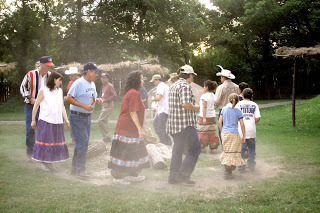 Since it's April 1st, the beginning of National Poetry Month, I thought I'd post one of my poems. This one was published in Coal City Review (2012). It's based on memories of attending stomp dances with my extended family when I was a child. I haven't had the opportunity to attend a stomp dance in recent years. Stomp dances were brought from the Southeast with the Cherokee and other tribes. They are not just great get-togethers for family and clan members. They carry strong spiritual significance, as well. So it's important that they be done in a good way.
Since it's April 1st, the beginning of National Poetry Month, I thought I'd post one of my poems. This one was published in Coal City Review (2012). It's based on memories of attending stomp dances with my extended family when I was a child. I haven't had the opportunity to attend a stomp dance in recent years. Stomp dances were brought from the Southeast with the Cherokee and other tribes. They are not just great get-togethers for family and clan members. They carry strong spiritual significance, as well. So it's important that they be done in a good way.AT THE STOMP DANCE
Cars, trucks, all day coming.First the leaders and their helpersset up the cook shed,clean, rake the ball and dance grounds, refurbish the seven brush arborscircling the dance ground—helpers from each clan do this.
The women bring hot and cold dishes from home, begin to cook and cover tableswhile men build the sacred fire, centered in the dance ground’s circleto reflect the sun.
The crowd grows.Flirting, catcalling between young men and womenturns into challenge. Head for the ball ground,men grabbing ballsticks, women hands free—all the better to rest on a hip while calling a sassy retort.Game on, men against women,each plays by their own set of rulesto much laughter and hooting.The sad-eyed carved fish swimming through the airon top of the pole in the center of the ball groundwatches benevolently while the ball whizzes pastor—success!—strikes it.
Older women and others not playing call out encouragement and laughing insults.So do the older men, sitting in their lawn chairs. All the while, final preparations continuefor the main event, the dance.Women work on old cowboy boots,making sure their turtleshell rattleshanded down the chain of daughters,are securely fastened to the split-open tops of the boots.They try them on and stamp their feet hard to check the sound of the pebbles in the rattles,to make sure they won’t come loose.
Children are everywhere underfoot, watching ball game and sacred fire, sniffing around the cook shed, playing tag and hide-and-seekoutside the ring of clan shelters.The elders of each clan—Ani-Wahya (Wolf), Ani-Kawi (Deer), Ani-Tsisqua (Bird),Ani-Gilahi (Long Hair), Ani-Sahani (Blue), Ani-Wadi (Paint),
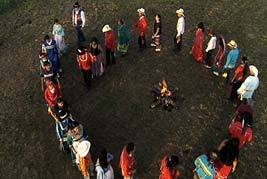 and Ani-Gatagewi (Wild Potato)—settle into each brush arboras the cooks call out that the food is ready.Clan members bring food to the elders,join them or eat with families, friends.
and Ani-Gatagewi (Wild Potato)—settle into each brush arboras the cooks call out that the food is ready.Clan members bring food to the elders,join them or eat with families, friends.Now, the food is eaten and dishes cleaned.Now, the turtledoves are calling as they nestle in to sleep.Now, the fireflies are taking to the air with children chasing.Now, the sun has set and the sacred fire brings back its light.Now, the women put on their rattle-sewn boots.Now, the old lead singer calls out the beginning, Now, his brothers and nephews echo their response.Now, his sisters and nieces step into the circle beside them. Now, the women set the rhythm with their fast turtleshelled feet.Now, the circle spirals out from the fire.Now, the dance can begin.
Published on April 01, 2013 15:08
March 26, 2013
Deborah Miranda’s Bad Indians—An Important and Necessary Book
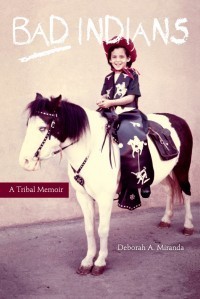
Deborah A. Miranda’s Bad Indians: A Tribal Memoir (Heyday Books) is a book I’ve been anticipating ever since I first met the author and heard what she was working on.
Caveat: Deborah Miranda is a good friend, and we bonded from our first meeting because our backgrounds are so similar and we have so much in common. But I would have been anticipating the book eagerly if I’d never met the author but only heard about the book. For most of my lifetime I’ve been waiting for this book. I know this book is so important and much needed out in the world, so I would be remiss to avoid telling my blog readers about it simply because I’m close to the author.
In Bad Indians, Miranda traces the history of the Ohlone Costanoan Esselen tribe through her own search for the history of her own family, through the story of the violent missionization of California, the exploitation of those indigenous people and the theft of their land, language, and history. The padres enslaved, beat, raped, and killed the Indians they found on the land they wanted for their missions and settlements, and Miranda documents the historic record of this process and the destruction it wreaked on the peaceful tribes the priests initially found.
“All my life,” Miranda writes, “I have heard only one story about California Indians: godless, dirty, stupid, primitive, ugly, passive, drunken, immoral, lazy, weak-willed people who might make good workers if properly trained and motivated. What kind of story is that to grow up with?” She knew the true story was more than that. “Story is the most powerful force in the world,” she says, “in our world, maybe in all worlds. Story is culture.” Bad Indians is the result of a decades-long search for that story, that culture.
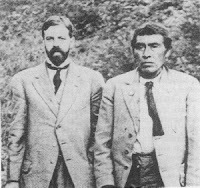 In 1925, renowned anthropologist Alfred Kroeber pronounced the Esselen people and culture extinct, based on a flawed census of California Indians, and the Bureau of Indian Affairs designated the Esselen tribe “terminated.” By 1955, Kroeber had come to realize his mistake and argued with demonstrations of evidence to the BIA that the Esselen still lived and should be recognized, something Miranda’s and other families have been fighting to regain for many years. However, the BIA has never rectified its mistake.
In 1925, renowned anthropologist Alfred Kroeber pronounced the Esselen people and culture extinct, based on a flawed census of California Indians, and the Bureau of Indian Affairs designated the Esselen tribe “terminated.” By 1955, Kroeber had come to realize his mistake and argued with demonstrations of evidence to the BIA that the Esselen still lived and should be recognized, something Miranda’s and other families have been fighting to regain for many years. However, the BIA has never rectified its mistake.In a place and time where California Indians were legally enslaved and where the federal and state governments paid bounties for the corpses or body parts of Indians (to prove they’d been killed), many California Indians chose to “pass” themselves and their children as Mexican rather than claim their true identity, which could put them into slavery or the grave. Well into the 20th century, at about the time Ishi was discovered and the Esselen were declared extinct, people decided that it was finally time to repeal the laws paying bounties for the killing of Indians.
Miranda writes about these tragedies. She brings them into the light through documents, passed-down and anthropologist-recorded stories, and her own poems and lyrical essays. All that’s been left of her tribal history lies in pieces and shards, so she puts those broken bits together into a mosaic that speaks of violence and exploitation yet echoes with the beautiful strength and resilience of her ancestors.
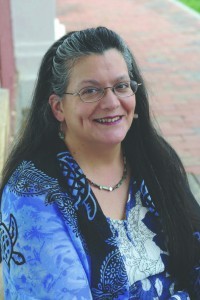 She also writes of how the violence and trauma forced on her tribe recapitulate in the history and actions of her own family, in her own history. “I wondered if, in order to survive, we had become destroyers, like them,” she asks. “Was there no way out of this self-perpetuating cycle of cruelty?” Through her examination of the history of her people and her family, she brings awareness of the larger history of the many indigenous peoples of the United States. The details may change, but the general outline of violence and cruelty, reslience and survival always remains.
She also writes of how the violence and trauma forced on her tribe recapitulate in the history and actions of her own family, in her own history. “I wondered if, in order to survive, we had become destroyers, like them,” she asks. “Was there no way out of this self-perpetuating cycle of cruelty?” Through her examination of the history of her people and her family, she brings awareness of the larger history of the many indigenous peoples of the United States. The details may change, but the general outline of violence and cruelty, reslience and survival always remains.The history is truly appalling, but the stories themselves are filled at times with the wry humor of the survivor and with the quiet strength of Miranda’s people. The lyrical manner of her mosaic telling of this history, of these stories, turns horror story into a kind of terrible beauty. This book is full of riches. Miranda has done a remarkable job of piecing together and laying out for our contemplation the history and irrepressible culture of her tribe and her family, and she has tempered her honesty with respect and thoughtfulness.
Published on March 26, 2013 13:55



